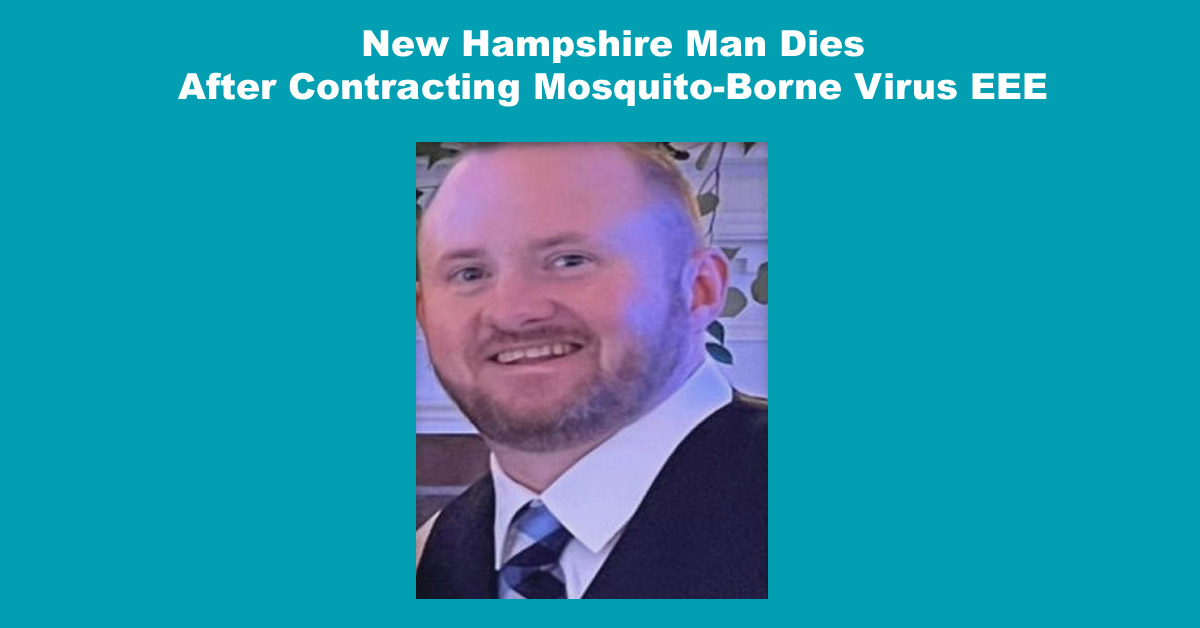New Hampshire Man Dies After Contracting Mosquito-Borne Virus EEE
New Hampshire Man Dies After Contracting Mosquito-Borne Virus EEE,
A 41-year-old man from Hampstead, New Hampshire, has died from Eastern Equine Encephalitis (EEE), a rare but serious mosquito-borne virus. Steven Perry, who was previously healthy, succumbed to the virus within a week of hospitalization. The incident marks a notable concern as EEE has recently been detected in mosquitoes and horses in New Hampshire. Massachusetts is also addressing EEE outbreaks with public health measures, including curfews and aerial pesticide treatments. EEE can cause severe brain inflammation and has no current vaccine or antiviral treatment.
Tragic Loss in Hampstead: Steven Perry’s Death Linked to Eastern Equine Encephalitis
A 41-year-old man from Hampstead, New Hampshire, has sadly passed away after contracting the mosquito-borne virus known as Eastern Equine Encephalitis (EEE). The victim, identified by his family as Steven Perry, succumbed to the virus within a week of being hospitalized with severe central nervous system disease. Perry’s family shared with WBZ that he was previously healthy and had no underlying conditions.
Remembering Steven Perry
In their tribute, Perry’s family described him as someone who “had a sense of adventure, lived a full life, and was happiest spending time with his family who meant everything to him.” His sister further elaborated, saying that Perry was known for his humor, optimism, intelligence, and drive. The last recorded case of EEE in New Hampshire was in 2014, a year marked by three infections and two fatalities.
Current EEE Situation in New Hampshire
As of this summer, EEE has been detected in one New Hampshire horse and seven mosquito batches. Dr. Benjamin Chan, state epidemiologist, highlighted that the risk of mosquito-borne infections, including EEE, is present statewide. “The risk for these mosquito-transmitted infections is believed to be statewide,” he said. Dr. Chan urged residents to take preventive measures against mosquito bites, especially with the ongoing risk continuing into the fall until a hard frost reduces mosquito populations.
Massachusetts Faces EEE Challenges
Recent EEE Diagnosis in Massachusetts
Massachusetts is also grappling with EEE cases. Earlier this month, a man in his 80s from Oxford became the first person diagnosed with EEE in the state since 2020. In 2019, Massachusetts reported 12 human cases of EEE with six deaths, and in 2020, there were five cases, including one death.
Public Health Measures in Massachusetts
In response to the heightened risk, the Oxford Board of Health has implemented an outdoor curfew to limit activities before dusk, when mosquito activity peaks. Plymouth has also closed parks and fields from dusk until dawn. Some counties are initiating mosquito spraying to combat the outbreak. Aerial pesticide treatments in Plymouth and surrounding areas will begin on August 27, with planes dispersing safe, effective pesticides from 8 p.m. to 2 a.m. Laura McGowan from Clarke, the company handling the aerial treatments, emphasized the efficacy and safety of this public health tactic.
Additionally, Massachusetts health officials reported two new cases of West Nile Virus (WNV) this week, raising the total number of cases this year to four. The affected areas include Suffolk and Norfolk counties, with several towns elevated to high risk for WNV.
Understanding Eastern Equine Encephalitis
Symptoms and Impact of EEE
EEE can cause flu-like symptoms such as fever, chills, muscle aches, and joint pain. In more severe cases, it leads to inflammation of the brain and spinal cord membranes. About one-third of those who develop EEE die from the infection, while many survivors may face long-term physical or mental impairments. Currently, there is no vaccine or antiviral treatment for EEE.
The threat of EEE typically diminishes with the onset of the first frost, which reduces mosquito populations and mitigates the risk of infection.
Stay informed and take preventive actions to protect yourself and your loved ones from mosquito-borne diseases.
Famous Memorial and Join TELEGRAM
New Hampshire Man Dies After Contracting Mosquito-Borne Virus EEE
FAQs Eastern Equine Encephalitis (EEE)
What is Eastern Equine Encephalitis (EEE)?
Eastern Equine Encephalitis (EEE) is a rare but severe mosquito-borne virus that can cause inflammation of the brain and spinal cord membranes. Symptoms can include fever, chills, muscle aches, joint pain, and in severe cases, brain damage or death.
How is EEE transmitted?
EEE is transmitted through the bite of an infected mosquito. The virus is not spread through person-to-person contact but can affect both humans and animals, including horses.
What are the symptoms of EEE?
Symptoms of EEE include flu-like symptoms such as fever, chills, muscle aches, and joint pain. In severe cases, it can lead to brain inflammation, which can be fatal or result in long-term physical or mental impairments.
Is there a vaccine for EEE?
Currently, there is no vaccine or antiviral treatment available for EEE. Prevention focuses on avoiding mosquito bites, especially in areas where EEE is known to be present.
What precautions can be taken to prevent EEE?
To prevent EEE, avoid outdoor activities during peak mosquito hours (dawn and dusk), use insect repellent, wear long sleeves and pants, and ensure that windows and doors are properly screened to keep mosquitoes out.
What public health measures are being taken in response to EEE outbreaks?
Public health measures include implementing curfews to limit outdoor activities, closing parks and fields, and conducting mosquito spraying operations. These efforts aim to reduce mosquito populations and lower the risk of transmission.
What should you do if you suspect you have EEE?
If you experience symptoms of EEE, especially after being in an area with known mosquito activity, seek medical attention immediately. Early diagnosis and treatment are crucial for managing the disease.






